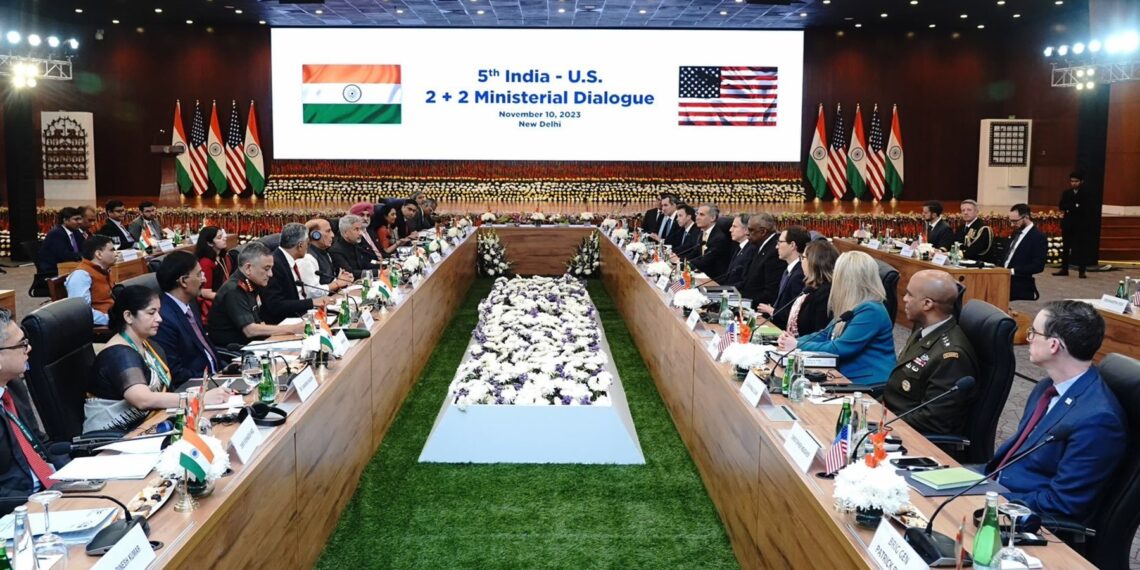India and China appear to be singing the same tune on the vexed issue of general elections in Bangladesh.
While India’s Ministry of External Affairs (MEA) today termed the elections in Bangladesh, due to be held in early January 2024, as an “internal issue” of that country, China used nearly identical expressions on November 9, saying that the “elections are completely an internal issue of Bangladesh”.
Briefing newspersons following the India-US ‘2+2’ Ministerial Dialogue in New Delhi, Indian Foreign Secretary Vinay Kwatra said, “We did discuss very extensively regional issues and so far as Bangladesh is concerned, we shared our perspective very clearly in the dialogue”.
When asked by reporters whether recent political developments and election-related issues in Bangladesh came up for discussion between US Secretary of State Antony Blinken and Indian Foreign Minister S Jaishshankar, Kwatra said, “It is not our space to comment on the policy of a third country…the election in Bangladesh is their internal matter and it is for the people of Bangladesh to decide their future”.
There was no media briefing by the American side. Four days ago, a US State Department spokesperson, responding to a question, said, “We continue to closely monitor the electoral environment in Bangladesh leading up to this January’s election, and we take any incidents of violence incredibly seriously. We are engaging and will continue to engage with the government, with opposition parties, with civil society, and other stakeholders to urge them to work together for the benefit of the Bangladeshi people”.
ALSO READ US team in Dhaka to probe Oct 28 violence as Haas to join Nov 10 Delhi meeting
Quite obviously, the Indian stand flies in the face of the US’ unequivocal position that the ruling Awami League, faced with massive levels of anti-incumbency and public anger stemming from allegations of malgovernance, rampant corruption, human rights violations and anti-democratic measures, must ensure a free, fair, participatory and inclusive election.
The Indian stand on Bangladesh’s election is puzzling, considering the setback it suffered recently in the Maldives where Mohamed Muizzu, widely believed to be pro-Chinese, won the presidential election last month and immediately spoke up on the removal of Indian troops from the island nation’s soil.
India has, for long, maintained a pro-Awami League stand, turning a blind eye to widespread human rights violations and other anti-democratic measures by the Sheikh Hasina regime since at least 2014.
Indeed, MEA spokesperson Arindam Bagchi, responding to a newsperson’s question on November 9 on the countrywide crackdown on opposition BNP leaders and supporters – about 10,000 of whom have been thrown into jails across Bangladesh – said: “Crackdown, jailed opposition leader, etc. are your interpretation. Please don’t ascribe them to me. We do not want to comment on the policy of any third country. Elections in Bangladesh, as I have said, are a domestic matter for them. It is for the people of Bangladesh to decide their own future”.
In the same vein, Bagchi sought to send out the message that India remained a “close friend and partner” which “respects the democratic process in Bangladesh and we will continue to support Bangladesh’s vision of a stable, peaceful and progressive nation”.
ALSO READ US team in Dhaka to probe Oct 28 violence as Haas to join Nov 10 Delhi meeting
This is not very dissimilar to what Chinese ambassador to Bangladesh Yao Wen’s statement on November 9 when he said that his country expected an election as per the constitution and laws of the country.
Besides promising huge financial bailout packages to Bangladesh, whose economy was in a tailspin, the Chinese envoy was quick to caution that “China does not want any foreign intervention in the upcoming national election” and that “China itself does not interfere in the internal affairs of any country either”.
While driving home the point that the Bangladesh election was an internal issue, Ambassador Yao said, “Any decision regarding this shall be taken by the Bangladeshis. China expects that all the stakeholders will maintain the political and social stability in Bangladesh together. Bangladesh knows the kind of election required.”















